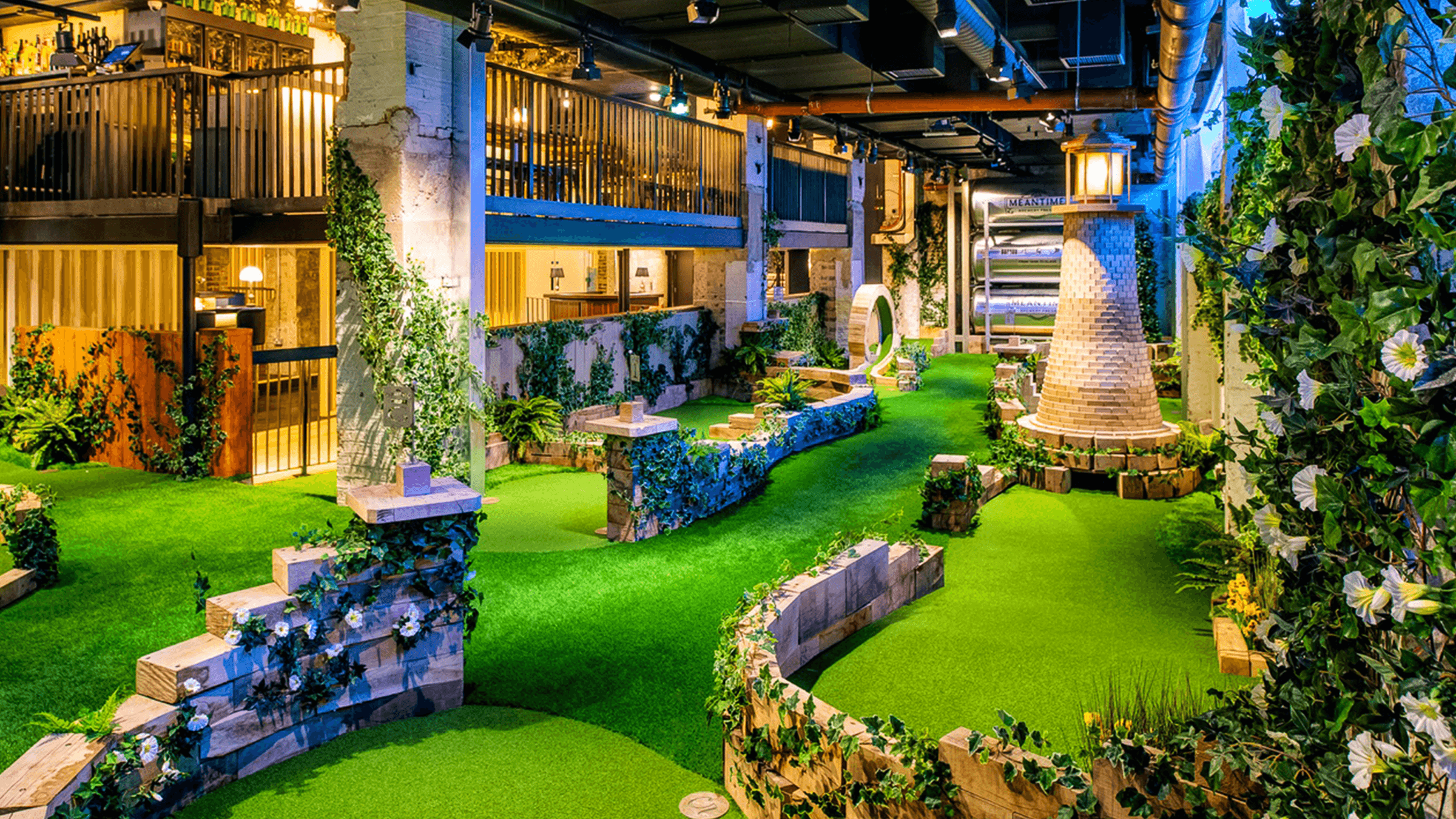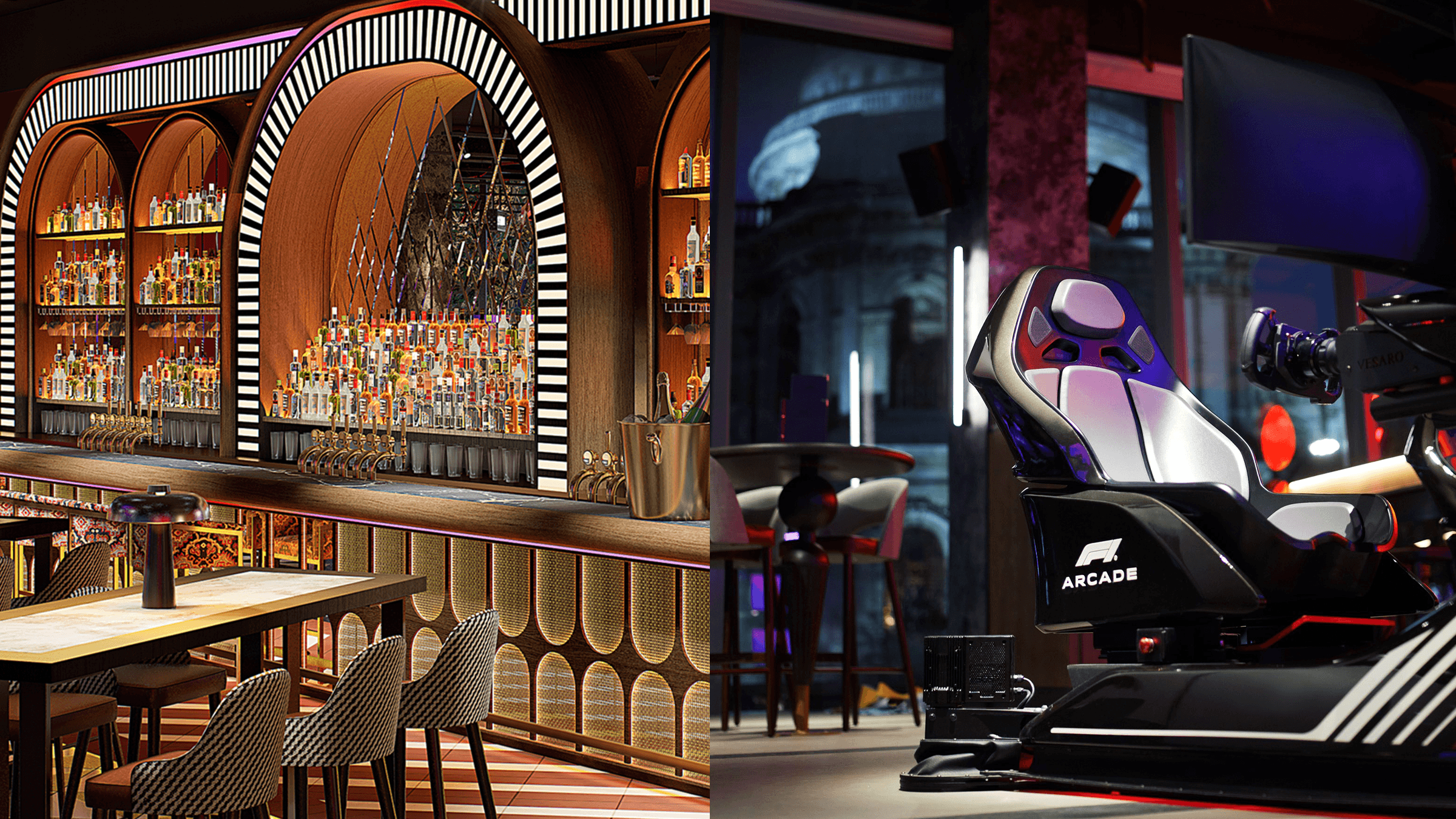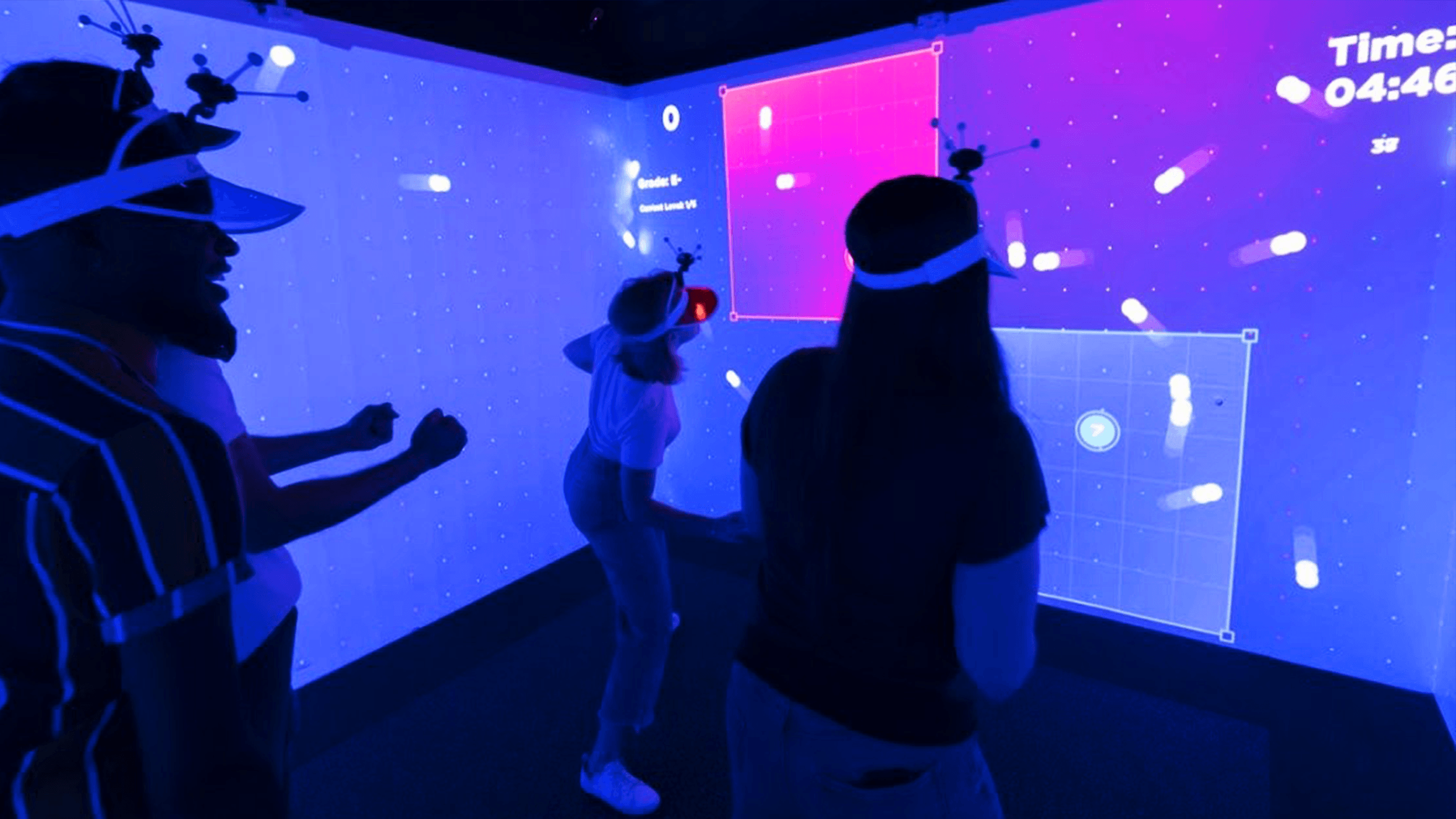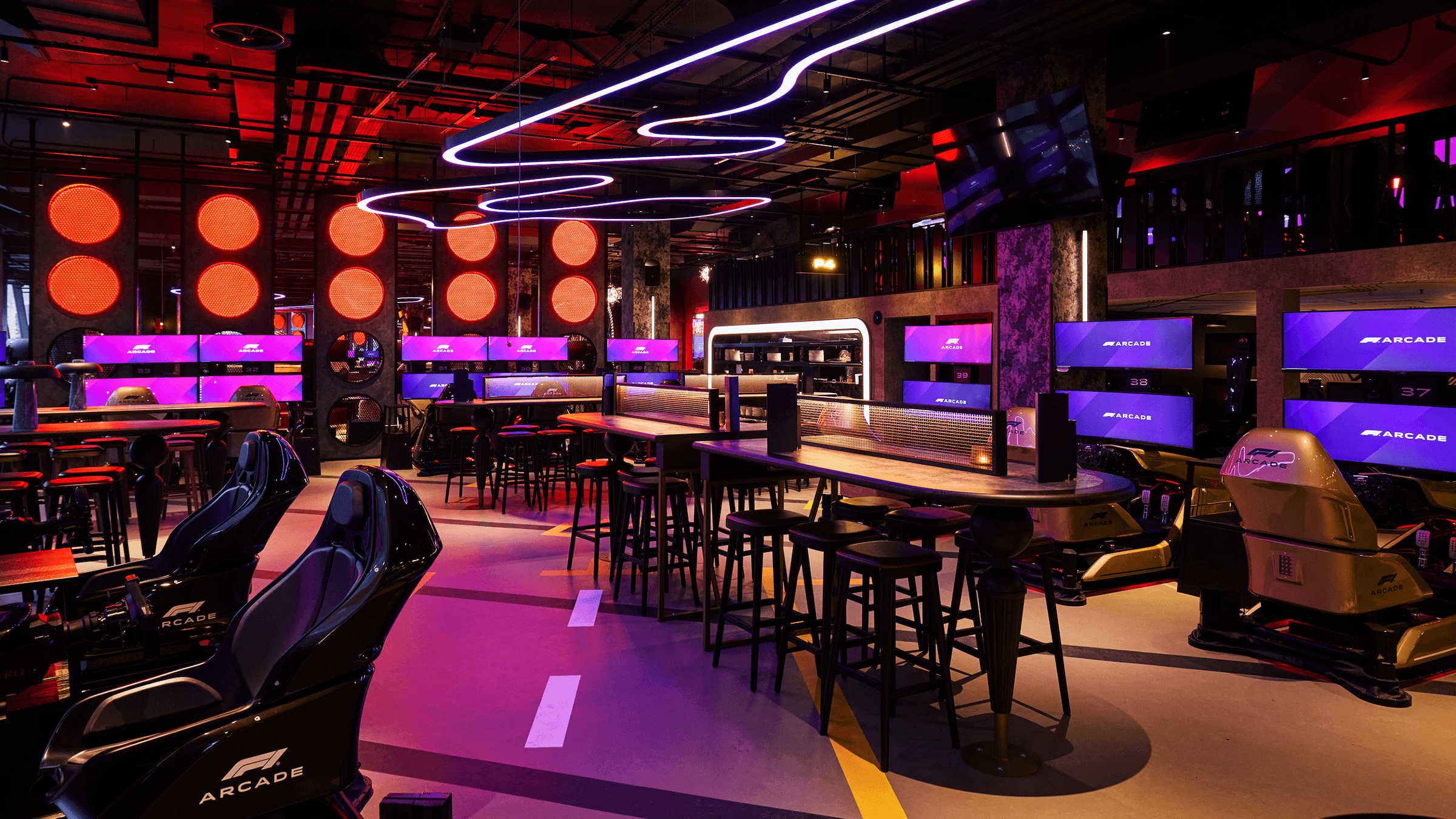‘Competitive socialising’ may be a new term, but it is certainly not a new concept. Punters were throwing darts in pubs as early as the fifteenth century, and anyone who’s played a game of pool in a bar or taken part in a pub quiz knows that a bit of healthy competition makes for a great evening. But in the past few years, the concept of competitive socialising has been revitalised, representing the biggest development to the leisure sector in many decades.
It’s a straightforward idea: customers play a simple game in a buzzy venue with music, food, and drink. Most competitive socialising locations are large-format sites found near business districts, with a vibrant and Instagram-friendly decor designed to attract millennial and Gen Z customers.
In the past ten years, we’ve seen a steady flow of new brands emerge. There’s Swingers (offering crazy golf), Puttshack (mini golf), Flight Club (darts), Electric Shuffle (shuffleboard), Sixes (cricket) and Bounce (ping pong). Some are taking a tech-first approach: at Toca Social, customers can compete in a digital version of a football penalty shootout, while Immersive Gamebox has created a one-of-a-kind entertainment experience which allows visitors to immerse themselves in interactive gameplay and transport to a new world based on their favourite table top game, tv show or film. One of the newest players is F1® Arcade, which has revamped the traditional arcade concept to offer racing simulators with group socialising in mind.

A large chunk of the industry’s brands can be traced back to the competitive socialising entrepreneur Adam Breedon, now CEO at F1® Arcade. With a background in restaurants and bars, Adam pioneered this corner of the UK leisure sector. He founded All Star Lanes in 2006, the first London venture to combine games (in this case, ten pin bowling) with a grown-up, premium cocktail offering. After All Star Lanes, Adam launched ping pong concept Bounce in 2012, darts bar Flight Club in 2015 and both the bingo experience Hijingo and tech-infused mini golf business Puttshack in 2018.
The market is certainly booming. According to US real estate firm Cushman & Wakefield, the industry has grown nearly 400% since the beginning of 2021. In the UK, brands have embarked on successful US expansion strategies: Flight Club now has six sites in the US, Swingers has three, and Electric Shuffle has two.
In many ways, the sudden spike in competitive socialising is not surprising. Its success reflects the growth of the experience economy, and speaks to a new generation of customers not content with spending their money on products and their free time in pubs and restaurants: recent research by KAM Media found that 41% of Gen Z customers in Britain have been to competitive socialising venues, and 47% would like to go in the future. And for the increasing number of people choosing not to drink alcohol, competitive socialising represents an evening of entertainment that’s not centred around drinking.
“41% of Gen Z customers in Britain have been to competitive socialising venues, and 47% would like to go in the future.”
“It’s a rapidly growing space,” said Jonathan Peters, CFO at F1® Arcade. “Fewer and fewer people are going shopping or eating out at casual dining restaurants. Customers today want unique, exciting premium experiences – and that’s what we’re offering them.” F1® Arcade provides a premium simulator racing experience designed for large and small groups, alongside an impressive F&B offering, DJs, and race-day “watch parties” during the Grand Prix.
This leisure concept caters to those who live their life online – so much so that many venues feel purpose-built to be shared on Instragram and TikTok. In a recent blog post, co-founder of crazy golf concept Swingers Matt Grech-Smith pin-pointed social media habits as a driving factor for launching the brand: “We could see that social media was driving the need to be seen to be doing interesting things,” he wrote, “And we knew that crazy golf was a winning idea.” At Swingers, which has two sites in London and three in the US, visitors play their way round a 9-hole course. A multi-coloured carousel, illuminous ferris wheel and a helter-skelter make the perfect Instagram story backdrop.

Crucially, the rise of competitive socialising has thrown a lifeline to commercial real estate landlords. Much has been written about the so-called death of the British high street, and today competitive socialising businesses are taking over unused property, creating much-needed vibrancy for shopping centres and retail precincts. In 2018, for example, Swingers took over a former BHS site on Oxford Street, and most shopping centres now feature competitive socialising concepts as anchor tenants.
“Competitive socialising businesses are taking over unused property, creating much-needed vibrancy for shopping centres and retail precincts.”
The market certainly isn’t slowing down, and rarely a week goes by without competitive socialising businesses making our industry news. Earlier this month, for instance, F1 Arcade closed a £30m round to fund expansion into the US, with the business planning to open more than 30 locations globally by the end of 2027. Last week, Junkyard Golf confirmed the opening of a new site in Camden, and on Monday, Ballerz – a new football-based concept centred on premier league-style drills and backed by players like Rio Ferdinand – announced plans to launch into Bluewater.
It will be interesting to see how the landscape evolves. While most concepts require large-format spaces, it may be the case that new brands (or different versions of existing brands) emerge to occupy smaller high street real estate.
Indeed, at Immersive Gamebox, small-box assets are key to the brand’s growth strategy: “we very deliberately have built a concept which doesn’t require large-scale property,” said Lisa Paton, Global COO. “Each of our gameboxes requires only12m sq of floor space, and we usually have around ten gameboxes per site. The assets we go after are much easier to come by than the property required by most other competitive socialising ventures. This also means we can be flexible when opening new locations – we can have presence in a cinema lobby with only two or three gameboxes, for example.” It is for this reason that Immersive Gamebox has taken an entertainment-first approach: “We don’t have a full F&B offering,” Lisa reflected, “in large part because it requires so much more space. We’re focused on the interactive cinema element.”

There are also lessons to be learnt by adjacent business, and we’re already seeing restaurant and hospitality brands integrate competitive socialising into their offering. Street food market chain BoxPark has an area dedicated to competitive socialising in one of its sites, and Butlins recently unveiled plans for a £15m entertainment centre at its Bognor Regis resort for autumn 2024, which will feature escape rooms, ‘Digi darts’, ‘TechPutt’, laser tag, AI tech-powered battling cage, shuffleboard, ‘glow pong’ and a games arena. Will other hospitality companies (perhaps quick service restaurant brands) follow suit?
“There’s plenty of room for more innovation,” said Lisa Paton. “I definitely think we’ll see F&B brands thinking carefully about how to involve immersive entertainment.”
Looking ahead, the winning businesses will be those that can stand out in an increasingly saturated market. If you’ve got any thoughts on the rise of competitive socialising, please get in touch – I’d love to hear from you.








